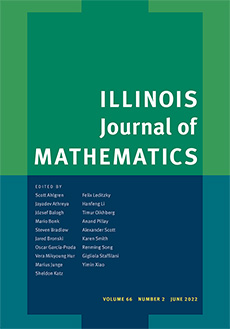Abstract
By an integral-elementary function we mean any real function that can be obtained from the constants, sin $x$, $e^{x}$, $\log x$, and arcsin $x$ (defined on ($-1,1$)) using the basic algebraic operations, composition and integration. The rank of an integral-elementary function $f$ is the depth of the formula defining $f$. The integral-elementary functions of rank $\leq n$ are real-analytic and satisfy a common algebraic differential equation $P_{n} (f,f',\ldots,f^(k))=0$ with integer coefficients.
We prove that every continuous function $f:\mathbf{R} \rightarrow \mathbf{R}$ can be approximated uniformly by integral-elementary functions of bounded rank. Consequently, there exists an algebraic differential equation with integer coefficients such that its everywhere analytic solutions approximate every continuous function uniformly. This solves a problem posed by L. A. Rubel.
Using the same basic functions as above, but allowing only the basic algebraic operations and compositions, we obtain the class of elementary functions. We show that every differentiable function with a derivative not exceeding an iterated exponential can be uniformly approximated by elementary functions of bounded rank. If we include the function arcsin $x$ defined on $[-1,1]$, then the resulting class of naive-elementary functions will approximate every continuous function uniformly.
We also show that every sequence can be uniformly approximated by elementary functions, and that every integer sequence can be represented .in the form $f(n)$, where $f$ is naive-elementary.
Citation
Miklós Laczkovich. Imre Z Ruzsa. "Elementary and integral-elementary functions." Illinois J. Math. 44 (1) 161 - 182, Spring 2000. https://doi.org/10.1215/ijm/1255984958
Information





